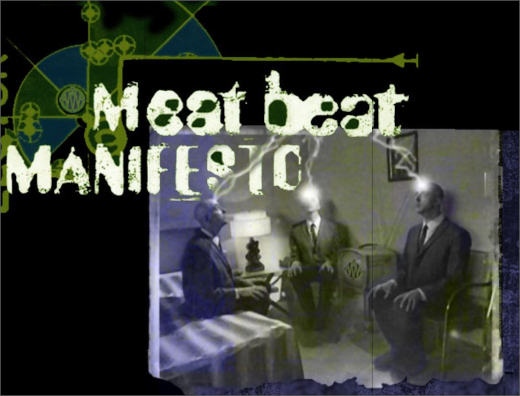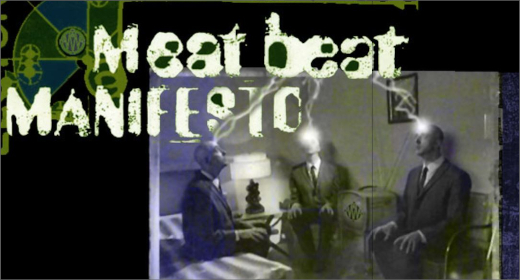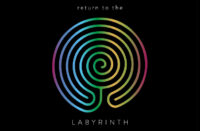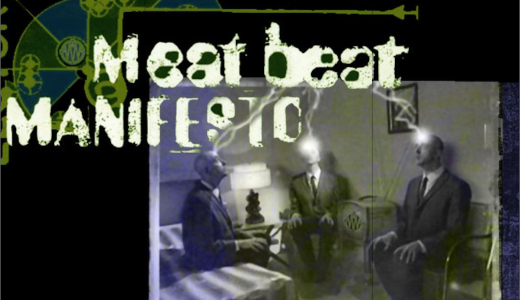Igloo Magazine presents a serialized, long-form oral history of the work of Jack Dangers, front man for Meat Beat Manifesto, Perennial Divide, Tino Corp, The JDs, and countless other monikers. These monthly installments will hopefully provide a definitive insight into the works of the man (originally) from Swindon, underrated genius of the last 40 years, and pioneer of three distinct musical genres of the late 20th and early 21st century. Chang Terhune’s interviews take twists and turns as he seeks to plumb the depths of this musical mind in a series we’re calling “Storming The Studio: 40 Years of The Future Worlds of Jack Dangers.”

XTC and the synthesizer tests
When last we left off, young Jack Dangers was hearing this strange new punk music through his elder sibling and schoolmates while growing up in the railtown of Swindon, UK. It seemed like Jack’s life was going to be similar to his forebears with a job at British Rail, followed by marriage, family, working then finally the quiet life of a pensioner.
When punk rock hit Jack was already a fan of music in the form of classic 70’s rock like 10cc and Thin Lizzy. But the new music was both shocking and intriguing. Young Jack found himself drawn to it to such a degree it would transform not only his life but that of those who heard his music and felt its power.
Another resident of Swindon who was swayed by controversial new music was one Andy Partridge, found of the highly influential power punk pop band XTC. For those who do not know XTC at all or only from their major hits you’ve heard on top 40 radio or at the market or shops (“King for A Day,” “Mayor of Simpleton,” “Dear God” et al) they were hugely influential and groundbreaking in their early years. Andy Partridge grew up listening to the Beatles among others and it was this love of music that changed the life of one young Swindonite—and a few years later that of another.
“If I had dissembled into that (life of working for British Rail) I wouldn’t be a musician,” says Dangers. “There wasn’t really anyone doing music in Swindon at that point, especially from the family I was from. They were not musical. My brother had some records and that was about it. But there was no instruments or anything like that and bands never played there except XTC.”
Jack found his way into the local recording studio where XTC worked on their seminal album English Settlement.
“Yeah, “ says Jack, “It was… and I’ve told him (Andy Partridge) this before, and in many interviews—if it wasn’t for that period of time it wouldn’t have given me the balls to think you could even be making music or anything like that.”
“I still find it amazing now,” he says. “I wormed my way in there and I got to work in the studio. I was tape-opping when Andy was doing the soundtrack for a film. I got to see, you know, how sound tracks can be made when he was in the studio. Sadly, that studio was burnt down for insurance purposes few months later by the owners. So they went back to what it was. It went, went back to nothing for a few years.”
Given how different the two bands and front men are—XTC’s love of 60’s psychedelia and harmony vs. Meat Beat Manifesto’s love of noise, free jazz, hip hop and the weird—it’s incredible to realize that XTC gave much of Jack Danger’s musical career its foundation.
Take for instance, the deep, thudding bass that powers much of MBM’s music. It’s not just from Jack’s love of dub reggae that it features heavily in the music. It was yet another aspect of his young interactions with the member of XTC that helped form this.
“At that time that I just began playing bass.” Says Jack. “I mean I’d just bought a bass. So as I’m learning, I’m able to watch Colin Moulding because he’s one of my favorite bass players. Yeah it was crazy! It was just mental that that opportunity came up.”
“But I was the only one in the rehearsal space when they were rehearsing for English Settlement, just sitting on the flight cases waiting to be chucked out and they never chucked me out. So I got to see all of that and it was kind of a moment.”
“It was… and I’ve told him (Andy Partridge of XTC) this before, and in many interviews—if it wasn’t for that period of time it wouldn’t have given me the balls to think you could even be making music or anything like that.”
This would be the brief and final tour for XTC before Partridge’s mental health issues became too much to bear and his crippling stage fright prevented him from ever taking the stage again. It was during this time that Jack had an interaction with something which would change the course of his life forever.
“Yeah,” he says, “They had a synthesizer in there and I got to messing around and doing recordings at night when they’d all gone home.”
Were this a film, the scene might look like this. A young man in a Throbbing Gristle t-shirt pokes his head around the door of a recording studio. It’s empty and dimly lit. But in the corner under a brightly lit spotlight is a gleaming wooden, metal and plastic keyboard with the words Sequential Circuits Prophet 5 emblazoned on a plate on the lower right hand side between the keys and rows of lower knobs. We see the young man look around to make sure the coast is clear before tentatively approaching the keyboard and reaching out with one hand. The hand hovers centimeters above a key before finally, slowly, painfully slowly descends and presses it to emit a sound so weird and unique it rewrote and scrambled his brains as much as a lightning strike.
This is as momentous a moment as a young Gary Numan encountering a Minimoog a few years before in a studio in London where that device under those hands would usher in a sound and movement that echoes in music today and indefinitely. Two young Englishmen searching for something new and different both found their path through chance encounters with American synthesizers.
Though Jack’s encounter with this Prophet was brief, it was momentous.
“I did blab one day,” says Jack. “I went in the session and I was a tape op, you know, just rewinding and playing and recording tapes was my job. And I did blab saying, ‘Oh that thing sounds really good.’ And then the cat’s out of the bags and then it disappeared the next day.”
Perhaps it was the sudden lack of those knobs and wires and circuits and keys in his life that cemented one certainty in the mind of young Jack Dangers there in that studio in 1981. One thing is clear that in order to give the body of his music its freedom, Jack was going to need to strap down and get one or more of those synthesizers to create the prime audio soup of his music.
Graphic by Digital Chemist















![Ndorfik & madebyitself :: Solos EP (People Can Listen) — [concise]](https://igloomag.com/wp/wp-content/uploads/2025/04/ndorfik-madebyitself-solos_feat-75x75.jpg)







